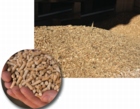Solid assurance from HETAS

Mark Russell explains how a new scheme to guarantee wood and biomass fuel quality will benefit the whole supply chain — from manufacturer to end user.
Wood is the oldest fuel known to man, and with renewables high on the energy agenda, wood in the form of biomass is enjoying a resurgence in popularity.
Increasing awareness of environmental damage caused by the use of fossil fuels has led to a growing interest in using wood as a sustainable, renewable, low-carbon alternative. As trees grow they absorb carbon dioxide (CO2), incorporating the carbon into new growth and returning oxygen to the atmosphere. When the wood is burned this carbon is released as CO2, with the result that wood is categorised as a low-carbon fuel.
However, poor-quality fuel will result in poor-quality combustion.
Moisture content has the biggest effect on heat output from wood. Water has to evaporate away before the wood or biomass will burn, using up energy and reducing the amount of useful heat as opposed to steam up the chimney. Wood and biomass with a high moisture content can be exceptionally difficult to light and will produce lots of smoke and tars. These tars can be corrosive, potentially damaging the lining of the flue and increasing the danger of a chimney fire.
For domestic, commercial and industrial users, biomass fuel quality is vital, which is why the Solid Biomass Assurance Scheme (SBAS) has been launched. Set up with the help of funding from the Department of the Environment & Climate Change (DECC), SBAS will enable wood-fuel and biomass producers to market their products using the recognised HETAS SBAS logo to provide customers with a mark of quality assurance.
With four categories covering logs, chips, briquettes and pellets, SBAS is unique in the UK. Based on European EN standards, the scheme is tailored for the UK market and covers production and product distribution too. Wood pellets need to be handled correctly in transit or they can start to break down, causing a high percentage of dust in the boiler hopper feed. Pellets containing impurities such as plastic and stones can cause clinker and solidified ash, which will clog up the de-ashing system in a biomass boiler. All these issues are addressed by the SBAS certification process.
For wood chip, one quality issue is oversized pieces of wood which might clog the auger feed. But moisture content is the main potential problem of any wood fuel, and the maximum moisture content allowed for SBAS depends on the fuel category.
Many schools have installed biomass boilers, and reliability and low running costs are of the utmost importance. Although manufacturers may specify the quality of fuel to be used, without any way of testing the fuel end users are at the mercy of their suppliers. By using an assured fuel, end users can have confidence that their delivered fuel will perform reliably.

For boiler and chimney manufacturers, fuel quality is also of paramount importance. Biomass with a high moisture content will not necessarily produce the efficiency figures that manufacturers claim. Installers will get frequent call backs to equipment that is not working properly or is expensive to run. The end result is general dissatisfaction with the boiler or heating system – simply because the end user was not using fuel of guaranteed quality.
With biomass, one of the frequently discussed issues is security of supply. Although it must be acknowledged that the woodland area in Britain is limited, there is sufficient timber to meet foreseeable future demand. Managing woodland improves biodiversity, and increasing the proportion of managed woodland supports jobs in the forestry industry. Replacing imported fossil fuels with locally produced wood fuel improves fuel security and encourages local community.
One supplier that has already embraced the SBAS scheme is Hertfordshire based Certainly Wood. Producing 14 000 t of product per annum, the company supplies a range of wood-fuel products to domestic and commercial users. As the largest supplier of wood fuel in the UK, quality control is exceptionally important, and SBAS approval means the company can demonstrate quality assurance to their customers.
Just as there are standards guaranteeing the quality of gas supplied through pipelines to homes and businesses, so we should be able to guarantee the quality of biomass used to heat homes and businesses. High-quality producers must be able to demonstrate the calorific value of their fuel, and end users must be given the means to differentiate between good and bad quality fuel.
A full list of SBAS approved fuel suppliers is available on the HETAS website.
Mark Russell is the project manger with HETAS responsible for the Solid Biomass Assurance Scheme.








